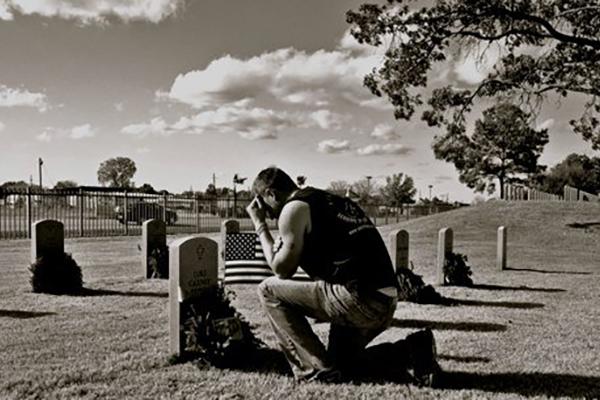Everything about that day should have been routine. Corporal Richard Casper and his troop were doing a typical patrol for IEDs, Improvised Explosive Devices, along the dusty roads in Iraq. They spotted an IED that looked particularly suspect. Instead of being hidden and inconspicuous, this one had obvious wires coming out of it as if someone was intentionally throwing them off the scent.
To this day, Richard Casper doesn’t know if the IED was an exhaust or propane tank. But the next thing he heard was a “huge… snap, like Kevlar or something ripping,” and his eyes immediately found Luke’s. His best friend was exactly where he was supposed to be, at his post manning the gun on the Humvee. When he slouched to a sitting position Richard ran to his side. “Are you shot?” he asked. Luke responded, “I don’t know.”
Those were his last words.
When Corporal Casper returned home safely, he experienced many emotions but relief wasn’t one of them. While he had sustained a back injury, TMJ and arthritis, he was suffering the most from internal wounds nobody could see. He, like many other veterans, was feeling the unforgiving effects of PTSD. Often, Casper would be immobilized with severe migraine headaches. For months he lived in darkness.
“I had short term memory loss to go along with my anxieties, depression, and some back problems. Even though I could leave my house, I never wanted to because of my anxieties and just this deep feeling of wanting to be by myself. I found no interest in normal things like sports or hanging out anymore.”
To avoid becoming another statistic, Richard sought out an art class in Bloomington, IL. What he didn’t realize at the time was how much that small decision would change the trajectory of his life.
The transformation didn’t occur straightaway. For two years he learned how to communicate with the world through his artwork. Richard could see the difference in himself was undeniable, and he knew that expressing himself through a creative outlet was the reason. Slowly, he started forming an idea to help other veterans in the same way. Because Richard was working as a bouncer at Joe’s, where they hosted live music nearly every night, access to singer/songwriters was easy. But getting them to listen to him was the hard part. Finally, someone heard what he had to say.
Although he had the night off, Richard took a seat at the bar. He knew there was a writing round for four professional songwriters, and he was planning on approaching them after the show. The most well-known songwriter onstage was Mark Irwin, who had written for Tim McGraw and Taylor Swift. Backstage, Richard asked if he was interested in collaborating with veterans and helping them turn their stories into songs. Instead of walking away as others had done before, Mark wanted in on the spot.
With Mark on his side, Richard’s vision had some traction. What soon materialized was the basic structure for what would become Creativets, a life-changing (and in Richard’s case, life-saving) experience aimed to help disabled veterans cope with returning home. His idea was to give vets an opportunity they couldn’t turn down. He knew if he flew them down to Nashville, paired them with musicians and songwriters, and covered all expenses for 3 days, they would come. And they would heal.
Enter Chive Nation. Creativets needed money to continue helping disabled veterans, and Chive Charities immediately responded with a $25,000 grant. Because of that donation, 25 veterans’ lives would change.
[youtube https://www.youtube.com/watch?v=iWyR_wa-C7k&w=600&h=338%5D





